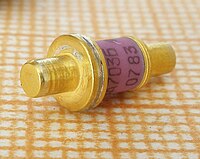
Photo from wikipedia
This study proposes a learning impedance controller comprising a proportional feedback control term, a composite-learning-based uncertainty estimation term, and a robot-environment interaction control term. The impedance control problem is converted… Click to show full abstract
This study proposes a learning impedance controller comprising a proportional feedback control term, a composite-learning-based uncertainty estimation term, and a robot-environment interaction control term. The impedance control problem is converted into a particular reference-trajectory tracking problem based on a generated reference trajectory. The proposed controller ensures the exponential convergence of the auxiliary tracking error and the uncertainty estimation error. The interaction control term improves the transient control performance through suppression/encouragement of the incorrect/correct robot movements. The composite-learning update law enhances the transient and steady-state control performances based on the exponential convergence of the uncertainty estimation error and auxiliary tracking error. Finally, the effectiveness and advantages of the proposed impedance controller are validated by theoretical analysis and simulations on a parallel robot.
Journal Title: Science China Information Sciences
Year Published: 2020
Link to full text (if available)
Share on Social Media: Sign Up to like & get
recommendations!